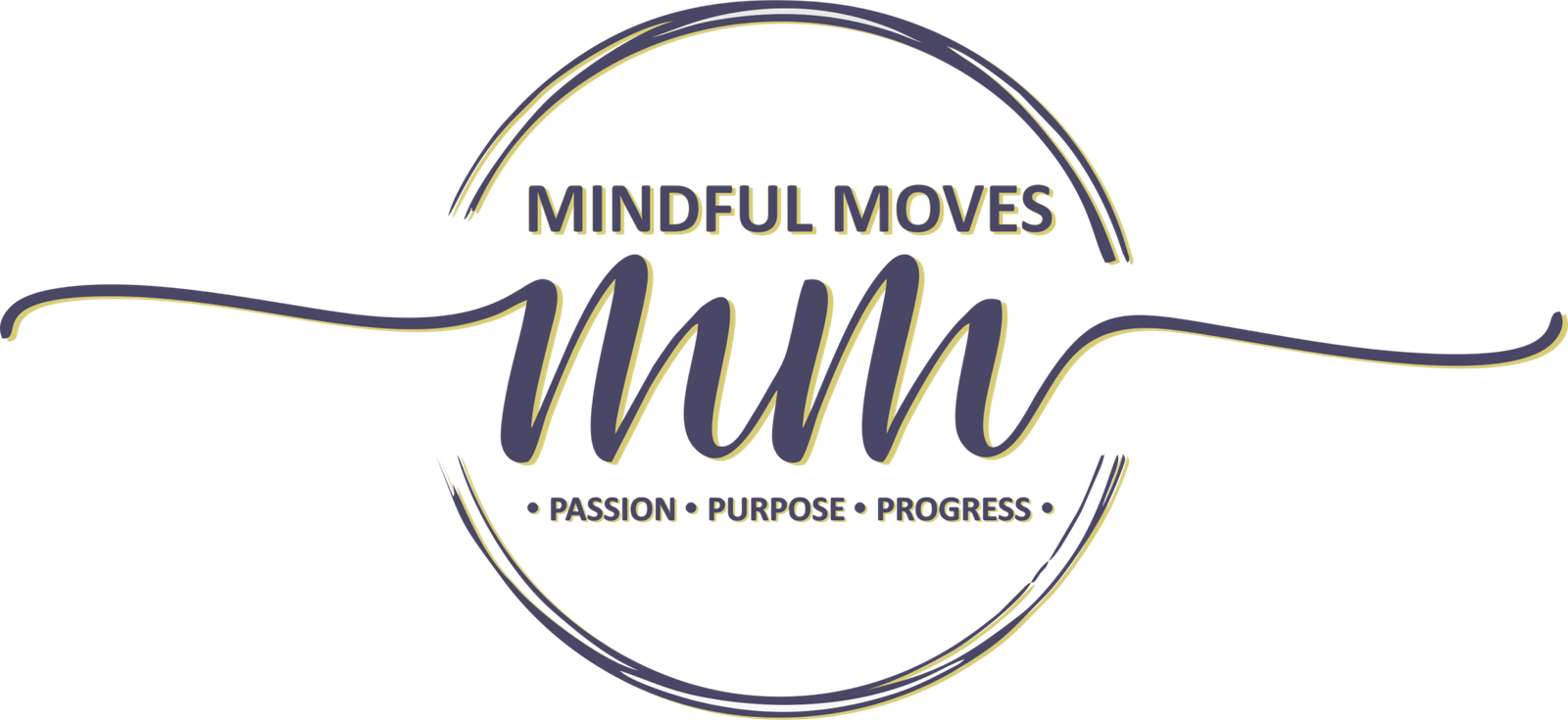What is Kinesiology?
People often don’t understand what I do when I explain that I’m what you call an Educational Kinesiologist or an Occupational Kinesiologist. When I say this, many do not understand the meaning of the word and put it in the “weird” box in their head. I believe it’s vital to understand the meaning of words to truly grasp what the word is describing.
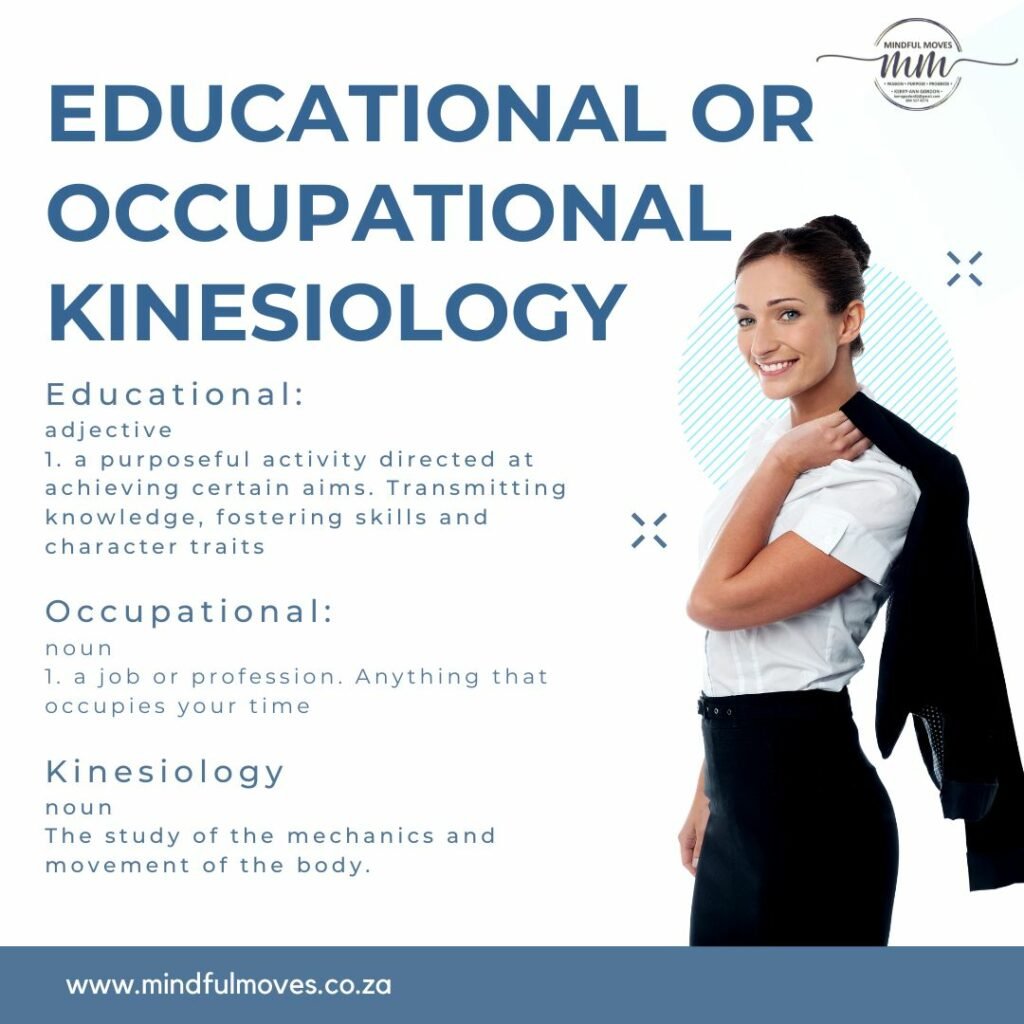
What is so important about movement?
Movement is a life process. Many of us who have recently helped a Grade 4 with science will remember the acronym MRS NERF, where the ‘M’ stands for movement. Just sitting still means our heart is beating, we are breathing, blinking, peristaltic movements are taking place in our digestive track, brain waves are occurring in our brain. We know it is the absence of these that mean death. Professor Bruce Lipton speaks about this in his lecture and book, ” Biology of Belief”. He shows different proteins and asks what is missing… that being movement.
Movement plays an important part in noticing all else.
We cannot divorce our systems from one another and how we move through our lives explains a lot about us. We think about our saying that explain how emotions, beliefs and understandings manifest physically. Sayings such as…
- to have a stiff upper lip
- to be sick to the stomach
- to be heartbroken
- to have a long face
- to have one’s head in the clouds
- to feel down in the dumps
- “dikbek” in Afrikaans and more
We move towards things we want more of, away from danger. When we are happy, we might have our heads in the clouds as opposed to feeling down in the dumps. We also might need to step to the side to avoid in line with what you want.
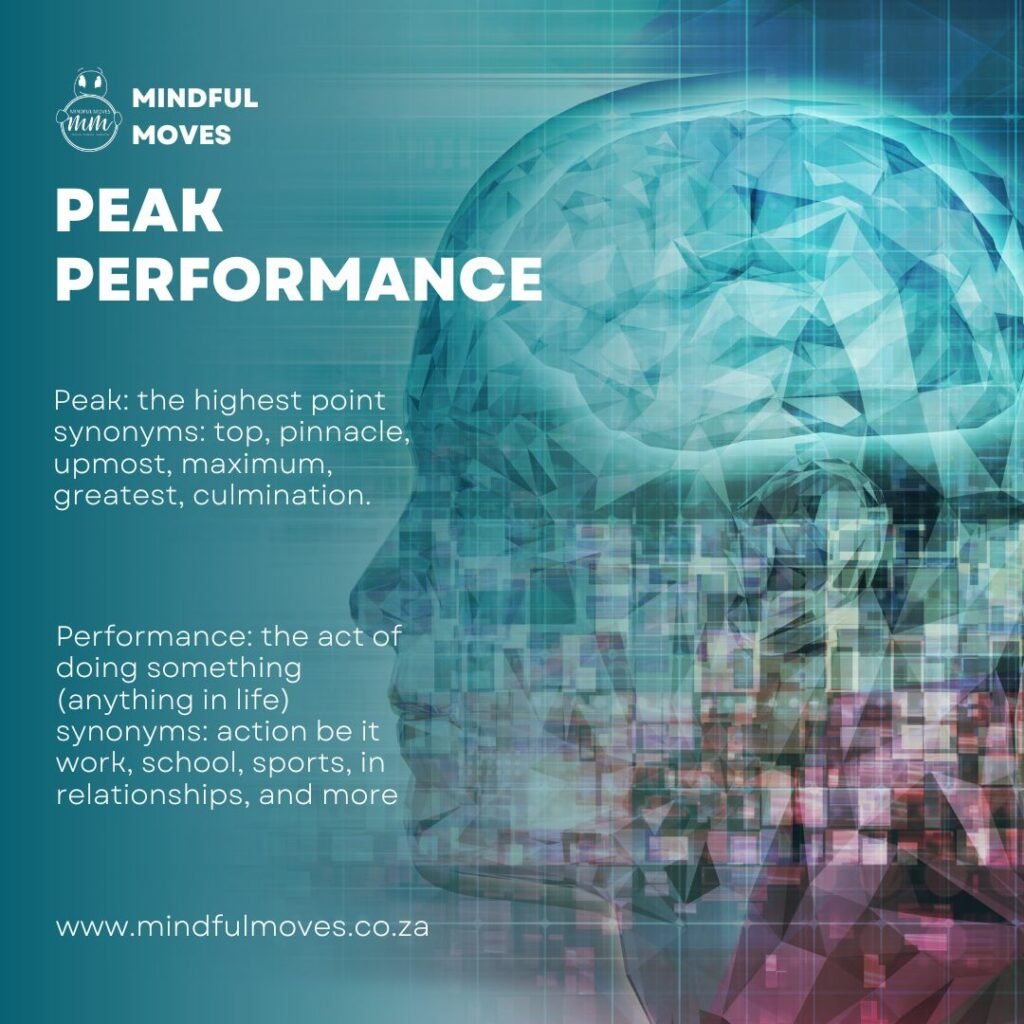
Movement means Peak Performance in all areas of your life.
We study movement. We observe how people move when happy and content versus anxious, nervous and overwhelmed noticing the way the body moves innately in order to support thinking, and feeling. Then using movement which calms and activates the brain, we bring in specific designed moves to support the person so that they can experience peak performance.
Knowing these allows us to assist people in experiencing peak performance. This means being about to work to our best in all areas of our lives. Most of the time we tend to be absent minded. We experience anxiety and we consider the future, and fearful considering past challenges. Being present, calm and alert, means that we can do our best in the gift that we call the present. When we can do our best more often, we can reach our unique potential.
Imagine performing at your optimal level…
- at work or school
- at home
- on the sports field
- on the stage
- when accessing your creativity
- within teams
- working towards health goals
- in relationship whether with your children, partner or friends
- with regards to your finances… and more
This will lead to a happier, healthier life.
Everyone can move, so movement is for everyone!
Using movement means that we can work with people of all ages, from new born babies to elderly people. It does not matter how much or how little you can move. This means that movement can be used with people who have less mobility or physical challenges to those who do not. Movement can be used;
- any person wanting to achieve any goal
- with people who have disabilities
- with people who suffer from ADD/ADHD, autism, dyslexia, dyspraxia, SPD, anxiety disorders and much more
- with the young
- with teenagers
- with spouses and partners
- with families
- with your staff
- to regulate moods, emotions and behaviours
- for motivation, better focus and work ethic
Mindful Moves has a passion the family and children.
I of course, coming from an Education background, I love to use it with learners of all ages. Using this work with younger children means that they can truly be school ready as they enter formal schooling. With older learners it means supporting them to achieve academically in the classroom. I tend to work with both learners who are experiencing challenges in the classroom as well as those achieving but with much effort which results in burnout and anxiety. In this space I often work with:
- Parents
- Teachers
- Learners
As we address the needs of our young children we need to build up parents and teachers. Happy, healthy moms and dads, perform better at work and at home. This includes teachers who will experience peak performance in the classroom as well. A solid, knowledgeable support system will go on to create children who are secure and ready to learn.
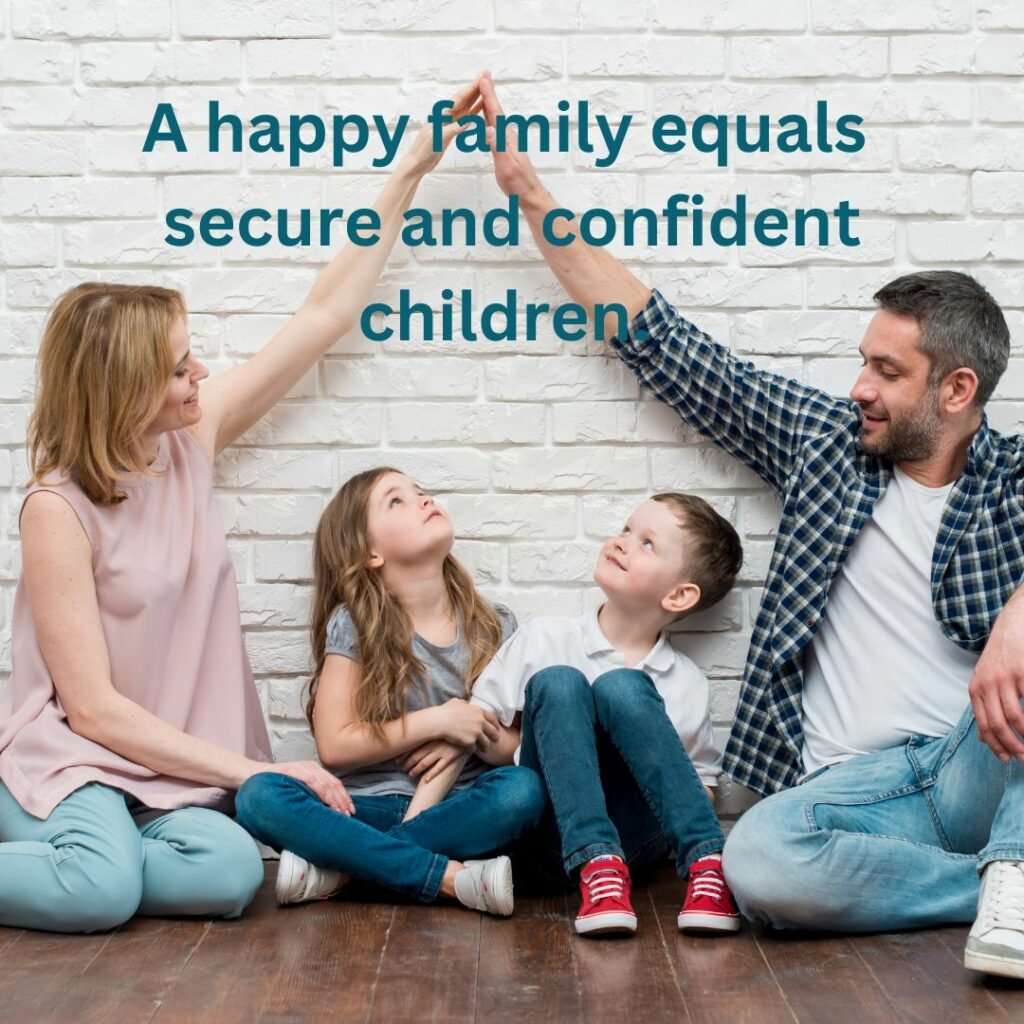
Happy families equals happy children.
Peak performance for learners may not mean 90% in all subjects, but it will mean they can do their best and discover their true gifts and talents before high school where they will choose subjects that will go on to support them in finding their place in the world and this is true education.
Education and the schooling system are meant to ready children for life! A child leaving the schooling system should feel confident in their abilities and support system. They should also have a very good understanding of who they are and what they are good at. When children are allowed to be themselves and are cherished for their individuality, they go on to be content adults who succeed.
Post Pandemic.
In 2023 Mindful Moves aims to get this work into the classroom. We are seeing children battling to take in and truly learn. Many teachers have been left frustrated and overwhelmed as previous teacher methods and strategies no longer seem to be working. This is mainly because schooling has shifted from the fundamental understanding that moving and experiencing IS learning to worksheets and textbooks. When work that is not age appropriate and relevant to a child’s experience, it cannot be understood nor can they add these skills to their own resources.
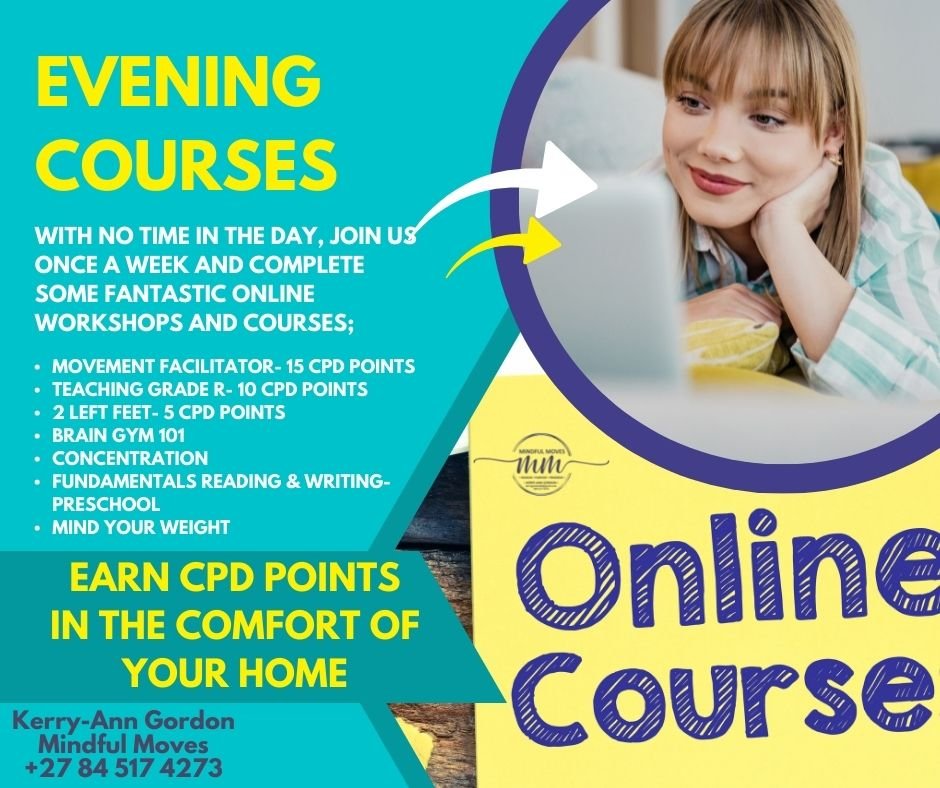
Movement Courses and Workshops for teachers and parents.
For this reason Mindful Moves is all about supporting teachers so that they can experience Peak Performance in their classroom. We have many courses that award CPTD points for teachers such as
- Teaching Grade R… an overview (10 points)
- The 26 Movements (15 points)
- Unpacking Behaviour (10 points)
- The Solution to Impaired Concentration (10 points)
- and many more.
These can be done online after hours for your convenience.
The study of movement allows us to understand our uniqueness!
Understanding that people are unique is key, and being able to notice their movement and changes in movement through their posture, gestures, body language and more allows us to bring in the more of the right movements to propel them towards their goals in life.
Let us know if you would like more information on our proven methods and strategies.
According to Albert Einstein “Insanity is doing the same thing over and over and expecting different results.” Why not try movement if you have never given it a chance. Contact me at info@mindfulmoves.co.za to find out how you can include movement in your life so that you can reach your full potential.

